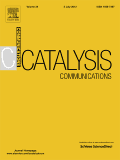
CATALYSIS COMMUNICATIONS
Scope & Guideline
Elevating Catalysis Knowledge to New Heights
Introduction
Aims and Scopes
- Catalytic Materials Development:
Research concerning the synthesis and characterization of novel catalysts, including nanoparticles, zeolites, and metal-organic frameworks (MOFs), aimed at optimizing their catalytic performance. - Environmental and Green Catalysis:
Investigation of catalysts and processes that promote sustainability, such as photocatalytic degradation of pollutants, biomass conversion, and CO2 reduction. - Heterogeneous and Homogeneous Catalysis:
Studies that explore both heterogeneous and homogeneous catalytic systems, including their mechanisms, efficiencies, and applications in various chemical reactions. - Biomass and Renewable Resources:
Research focused on the conversion of biomass into valuable chemicals and fuels, highlighting the use of catalysts to enhance efficiency and selectivity in these processes. - Electrocatalysis and Photocatalysis:
Exploration of catalysts that facilitate electrochemical reactions and light-driven processes, including hydrogen evolution and CO2 reduction.
Trending and Emerging
- Sustainable and Green Catalysis:
There is a notable increase in research focusing on sustainable catalytic processes, including biomass conversion, CO2 utilization, and environmentally friendly synthetic methods. - Nanocatalysts and Advanced Materials:
The development and application of nanostructured catalysts are trending, with researchers exploring their enhanced properties and efficiencies in various catalytic reactions. - Integrated Catalytic Systems:
Emerging interest in integrated systems that combine multiple catalytic functions or processes, such as tandem reactions and hybrid catalytic approaches, showcasing their potential for improved efficiency. - Electrocatalysis and Renewable Energy Applications:
Research in electrocatalysis, particularly for hydrogen production and CO2 reduction, is on the rise, driven by the demand for renewable energy solutions and sustainable chemical processes. - Machine Learning and Computational Catalysis:
The application of machine learning and computational methods to predict catalytic activity and optimize catalyst design is gaining momentum, reflecting a shift towards data-driven approaches in catalysis research.
Declining or Waning
- Traditional Catalysis without Sustainable Focus:
Research focused solely on traditional catalytic processes without consideration for environmental impact or sustainability is becoming less prevalent, as the field moves towards greener methodologies. - Conventional Metal Catalysts:
The emphasis on traditional metal catalysts without innovative modifications or sustainable practices is waning, as researchers increasingly explore alternative materials and methods. - Static Catalysis Studies:
Studies that do not incorporate dynamic or real-time analysis of catalytic processes are seeing a decline, as there is a growing preference for research that utilizes in situ or operando methodologies. - Narrowly Focused Reaction Mechanisms:
Research that focuses on very specific reaction mechanisms without broader implications or applications is becoming less common, as the journal encourages studies with wider relevance to the field. - Low-Impact Catalytic Applications:
Publications focusing on low-impact or niche catalytic applications are decreasing, as the journal prioritizes research that addresses pressing global challenges, such as energy and environmental sustainability.
Similar Journals

CCS Chemistry
Pioneering Discoveries in the World of ChemistryCCS Chemistry, published by the esteemed Chinese Chemical Society, is a leading open-access journal dedicated to advancing the field of chemistry. Since its inception in 2019, the journal has rapidly gained recognition, achieving a remarkable impact factor that places it in the prestigious Q1 category in Chemistry (Miscellaneous) as of 2023. With a Scopus ranking of #41 out of 408 in General Chemistry, CCS Chemistry represents the top 10th percentile in its category, reflecting its commitment to high-quality research and innovation. The journal serves as a vital platform for researchers and professionals to share their findings, showcase cutting-edge methodologies, and engage with the latest developments in various chemistry subfields. Accessible to a global audience, CCS Chemistry ensures that groundbreaking research is available without barriers, making it an indispensable resource for students and academics aiming to stay at the forefront of chemical sciences. For further details, submissions, and access to published articles, please visit the journal's website.

RESEARCH ON CHEMICAL INTERMEDIATES
Exploring the Nexus of Innovation in Chemical ResearchRESEARCH ON CHEMICAL INTERMEDIATES, published by Springer, is a prestigious academic journal that has been contributing to the field of chemistry since 1984. With an ISSN of 0922-6168 and an E-ISSN of 1568-5675, this journal serves as a vital platform for the dissemination of innovative findings and research advancements related to chemical intermediates. Situated in the Netherlands, it has established a commendable reputation, currently ranked in the Q2 category for miscellaneous chemistry and positioned at #131/408 with a 68th percentile in the Scopus rankings. Though it does not operate under an open-access model, the journal plays a crucial role in connecting scientists, researchers, and practitioners to facilitate a better understanding of synthetic methods, characterizations, and applications of various chemical intermediates. Continually publishing high-quality research until its anticipated convergence in 2024, this journal is an essential resource for those looking to expand their knowledge and contribute to the vibrant community of chemical science.

APPLIED CATALYSIS A-GENERAL
Pioneering the Future of Catalysis Research.Applied Catalysis A-General is a premier journal published by Elsevier that serves as a vital resource in the fields of catalysis, process chemistry, and technology. Founded in 1991, this esteemed journal has garnered considerable recognition, reflected in its classification in the Q2 quartile for both catalysis and process chemistry in 2023, as well as its notable rankings within the Scopus database, placing it among the top 20 journals in related disciplines. With an ISSN of 0926-860X and an E-ISSN of 1873-3875, the journal provides a platform for researchers and professionals to disseminate cutting-edge research findings, facilitate knowledge transfer, and foster innovation in the field. While not an open-access journal, it remains accessible through institutional subscriptions, ensuring that critical findings reach a broad audience. The journal's objectives include advancing the understanding of catalytic processes and their applications, making it an indispensable tool for those engaged in this dynamic area of study. Applied Catalysis A-General continues to play a vital role in shaping the future of catalysis, contributing to both scientific progression and practical advancements in various industries.
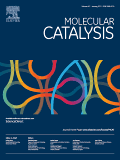
Molecular Catalysis
Unlocking the Potential of Catalysis for TomorrowMolecular Catalysis, published by Elsevier in Netherlands, is a premier academic journal that explores the cutting-edge domain of catalytic science. With an impressive impact factor and classified in the top quartiles (Q2) in various fields such as Catalysis, Physical and Theoretical Chemistry, and Process Chemistry and Technology, this journal stands as a significant resource for researchers and professionals committed to advancing the understanding of catalysis processes. Since its inception in 2017, it has been pivotal in publishing high-quality, peer-reviewed research that addresses crucial challenges and innovations in molecular catalysis. The journal is fully Open Access, allowing unrestricted access to its articles, thus fostering a wider dissemination of knowledge. Recognized for its rigorous editorial standards, it features works that push the boundaries of current scientific understanding, making it an essential platform for students and academics alike to share and grow in their expertise.
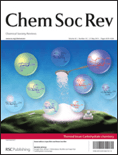
CHEMICAL SOCIETY REVIEWS
Fostering Global Dialogue in ChemistryCHEMICAL SOCIETY REVIEWS, published by the Royal Society of Chemistry, serves as an essential platform for researchers, professionals, and students in the field of chemistry. Since its inception in 1972, this prestigious journal has maintained its status as a leading publication, currently positioned in the Q1 category for Chemistry (miscellaneous) and ranking #2 out of 408 journals in the field of General Chemistry on Scopus, with an impressive 99th percentile recognition. With a focus on comprehensive reviews that synthesize key advancements and methodologies, it promotes open discussion and critical analysis crucial for driving innovation within the discipline. Although it operates under a subscription model, the journal strives to foster knowledge dissemination among the global chemistry community, ensuring accessibility to cutting-edge research and insights that shape the future of chemical sciences through its extensive array of articles.

Green Chemical Engineering
Exploring groundbreaking methods for environmental progress.Green Chemical Engineering, an esteemed journal published by KEAI PUBLISHING LTD, plays a pivotal role in advancing the field of sustainable chemical engineering. With an Open Access policy since 2020, this journal facilitates the free exchange of cutting-edge research and innovations that address critical environmental challenges. Based in China, it has rapidly gained recognition with impressive category quartiles, ranking Q1 in numerous relevant fields including Catalysis, Chemical Engineering (miscellaneous), Filtration and Separation, and Process Chemistry and Technology. Its presence in Scopus highlights its significance, with top rankings (e.g., Rank #4/19 in Filtration and Separation) placing it in the upper echelons of chemical engineering literature. Designed for researchers, professionals, and students alike, Green Chemical Engineering aims to foster a collaborative platform for the dissemination of pioneering work that contributes to a greener and more sustainable future.
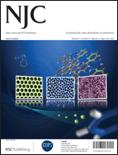
NEW JOURNAL OF CHEMISTRY
Elevating Knowledge in Chemistry and BeyondNEW JOURNAL OF CHEMISTRY, published by the prestigious Royal Society of Chemistry, serves as a vital platform for the dissemination of research in the dynamic fields of chemistry, catalysis, and materials science. With an impressive ISSN of 1144-0546, this journal boasts a rich history, having been established in 1996, and is set to continue its impactful publication through 2024. The journal is recognized in several categories, achieving a Q2 ranking in both chemistry and materials chemistry, and a Q3 rank in catalysis, reflecting its significance within these disciplines. Researchers will find it particularly noteworthy that the journal holds an esteemed position in the Scopus rankings, with a 65th percentile standing in general chemistry. Though it currently operates on a subscription model, its commitment to advancing the frontiers of chemistry makes it an essential resource for academics, professionals, and students seeking to keep abreast of the latest advancements and innovative methodologies in their fields.
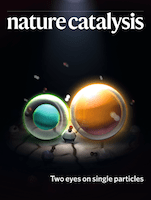
Nature Catalysis
Exploring the Frontiers of Biochemistry and CatalysisNature Catalysis is a premier academic journal published by NATURE PORTFOLIO, specializing in the rapidly evolving fields of biochemistry, bioengineering, and catalysis. With its ISSN of 2520-1158, this journal has emerged as an invaluable resource since its inception in 2018, contributing significantly to interdisciplinary research. Recognized for its high impact within the scientific community, it holds a prestigious Q1 ranking across multiple categories, including Biochemistry, Process Chemistry and Technology, and Catalysis as of 2023, illustrating its influence and authority in the field. Researchers will find impactful articles characterized by rigorous peer review processes that push the boundaries of knowledge in catalysis and its applications. While the journal operates with traditional access models, it remains accessible to a global audience interested in innovative research findings that promise to shape future developments in these critical areas. Positioned at the forefront of contemporary scientific inquiry, Nature Catalysis invites contributions that expand upon catalytic processes and technologies, which are crucial for advancing both fundamental science and applied engineering.

Chem Catalysis
Fostering collaboration for transformative chemical solutions.Chem Catalysis is a leading academic journal published by CELL PRESS, specializing in the diverse and dynamic field of chemistry. Since its inception in 2021, this open-access journal has rapidly ascended to prominence, holding Q1 quartile rankings in prestigious categories including Chemistry (Miscellaneous), Organic Chemistry, and Physical and Theoretical Chemistry. With its Scopus rankings placing it in the top tiers—Rank #14 in Organic Chemistry and Rank #12 in Miscellaneous Chemistry—Chem Catalysis serves as a vital platform for disseminating innovative research and catalysis science. Researchers and professionals seeking to stay abreast of cutting-edge developments will find this journal indispensable for advancing their knowledge and contributions to the field. Located in Cambridge, Massachusetts, Chem Catalysis is committed to fostering collaboration and innovation in the chemical sciences, paving the way for breakthroughs that address global challenges.
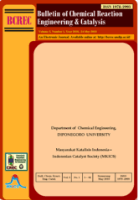
Bulletin of Chemical Reaction Engineering and Catalysis
Showcasing Transformative Insights in Chemical Reaction EngineeringBulletin of Chemical Reaction Engineering and Catalysis is a distinguished open-access journal published by UNIV DIPONEGORO, focusing on pivotal advancements in the fields of chemical reaction engineering and catalysis. Since its inception in 2008, this journal has served as a vital platform for disseminating cutting-edge research, catering to a diverse readership that includes researchers, professionals, and students in chemical engineering and related disciplines. With its dedication to publishing valuable insights, the journal has been indexed in Scopus and boasts respectable rankings across various categories, including Q3 in Chemical Engineering (miscellaneous) and Q4 in Catalysis as of 2023. It continues to foster scholarly dialogue and collaboration by providing an accessible means for contributors to share their findings. Operating from Semarang, Indonesia, this journal underscores its commitment to advancing knowledge in chemical sciences, making it an essential resource for those engaged in the study and application of chemical processes.